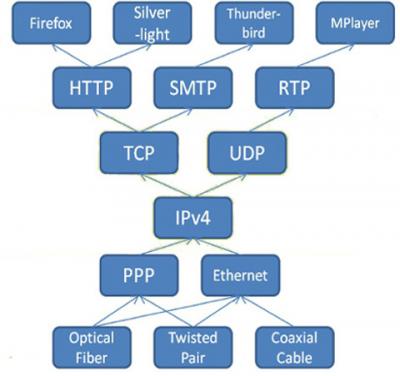How The Internet Got Its Hourglass Shape
The Internet's curvy figure.
Researchers at Georgia Tech have come up with an hourglass model that consists of six protocol and application layers that originate from a single bubble - IPv4. The scientists understand this model called EvoArch as an evolutionary process that leads to conclusions why some protocols survive and others do not. These new understandings could be used in future developments to evolve the Internet and help develop new uses and better security, the researchers said.
"To avoid the ossification effects we experience today in the network and transport layers of the Internet, architects of the future Internet need to increase the number of protocols in these middle layers, rather than just push these one- or two-protocol layers to a higher level in the architecture," said Constantine Dovrolis, an associate professor in the School of Computer Science at the Georgia Institute of Technology.
According to the model, there is a "plausible explanation" for the Internet's hourglass shape: "At the top, protocols are so specialized and selective in what underlying building blocks they use that they rarely compete with each other. When there is very little competition, the probability of extinction for a protocol is close to zero," the researchers explained.
"In the top layers of the Internet, many new applications and application-specific protocols are created over time, but few things die, causing the top of the hourglass to get wider over time," said Dovrolis.
In the higher layers, a new protocol can compete and replace an incumbent only if they provide very similar services, according to the EvoArch model. An example would be HTTP that largely replaced FTP. At the bottom, protocols serve as "general building blocks and share many products in the layer above." However, no bottom layer protocol can dominate as they are "used in an abundant way", which protects them from being eliminated. The researchers mentioned Ethernet as an example.
The key conclusion of the model is that few powerful and old protocols will be in the in the middle layers that are referred to as "evolutionary kernels", which include the pillars of the Internet and ensure its stability - IPv4, TCP and UDP. While these elements are difficult to replace, there can be a replacement, according to the scientists. The EvoArch model suggests designing protocols "that are largely non-overlapping in terms of services and functionality so that they do not compete with each other." Once the overlapping factor reaches 70 percent of their functions, protocols begin competing with each other.
Quality of the protocol is not always a guarantee for its success: "It is not true that the best protocols always win the competition," noted Dovrolis. "Often, the kernels of the architecture are lower-quality protocols that were created early and with just the right set of connections."
Get Tom's Hardware's best news and in-depth reviews, straight to your inbox.

Douglas Perry was a freelance writer for Tom's Hardware covering semiconductors, storage technology, quantum computing, and processor power delivery. He has authored several books and is currently an editor for The Oregonian/OregonLive.
-
acadia11 The question if it ain't broke, why fix it, TCP functions fine as the backbone of the internet why replace it. Unix/and it's derivatives Linux function great as OS model and have for some 40 years, again, why replace it. The more things change the more they stay the same. For example, cloud computing, it's the Mainframe model outside of the closed eco-system that was most mainframe architecture, i.e. the thin /dumb client ... connecting to the heavy duty cloud (main frame) which has your app storage, and data storage.Reply
It's now just been integrated to "Cloud" that is internet based, as opposed to a closed architecture.
The wheel has worked for some 60,000 years, its same basic protocol has not needed to be changed, with that said. Unless, there is a need to replace it, why do so, that's the point the researchers seem to miss. -
That for sure goes in my list of the 10 most stupid articles I've read in my life; by reading it I've lowered my IQ some points.Reply
-
SapienChavez juancI sometimes feel I those PhDs are more or less as intelligent as garbage collectors.Reply
education, like ignorance, has nothing to do with intelligence.
-
COLGeek To quote the great Homer Simpson...."Doh!!!"Reply
I wonder how many dissertations were based on this study? -
cypeq This picture is missing at least 40 arrows but I get the point to make it simplistic but I just don't know why internet construction never was and never will be so simple.Reply -
nicodemus_mm acadia11The question if it ain't broke, why fix it, TCP functions fine as the backbone of the internet why replace it. Unix/and it's derivatives Linux function great as OS model and have for some 40 years, again, why replace it. The more things change the more they stay the same. For example, cloud computing, it's the Mainframe model outside of the closed eco-system that was most mainframe architecture, i.e. the thin /dumb client ... connecting to the heavy duty cloud (main frame) which has your app storage, and data storage.It's now just been integrated to "Cloud" that is internet based, as opposed to a closed architecture. The wheel has worked for some 60,000 years, its same basic protocol has not needed to be changed, with that said. Unless, there is a need to replace it, why do so, that's the point the researchers seem to miss.Reply
A bicycle works fine for travel, but I'm not going to use it to go from Maine to California. The wheel also isn't made of stone now. The idea that because something "works" we shouldn't research improvements or replacements is ludicrous. Sometimes change brings about innovations in efficiency, reliability and new features to improve the lives of those using the product. That's how breakthroughs are discovered. Most of these are points that you seemed to miss.
~ Nicodemus
-
RazberyBandit This would have been great 10 to 20 years ago when IPv4 was still practical, but it's limitation of 4.3 billion unique addresses doesn't work today. IPv4's days on the Internet are numbered. The population and technology booms since it's adoption have significantly reduced it's expected lifespan. It'll still work great for closed networks, but it's no longer sustainable when it comes to outside communications.Reply
These guys should refocus themselves towards building a similar model for the future based on IPv6.
